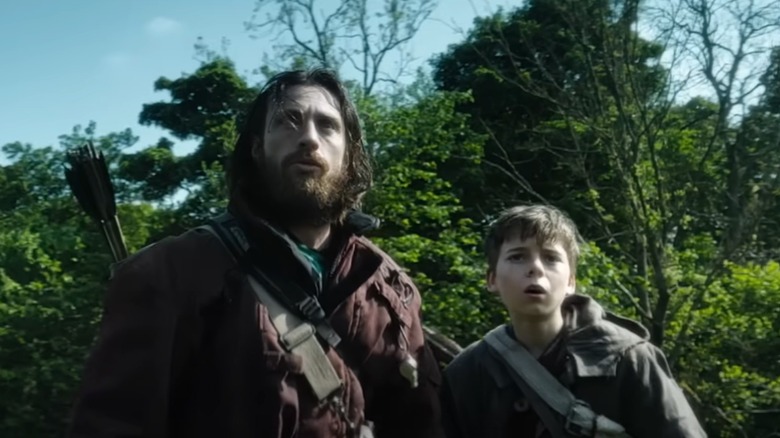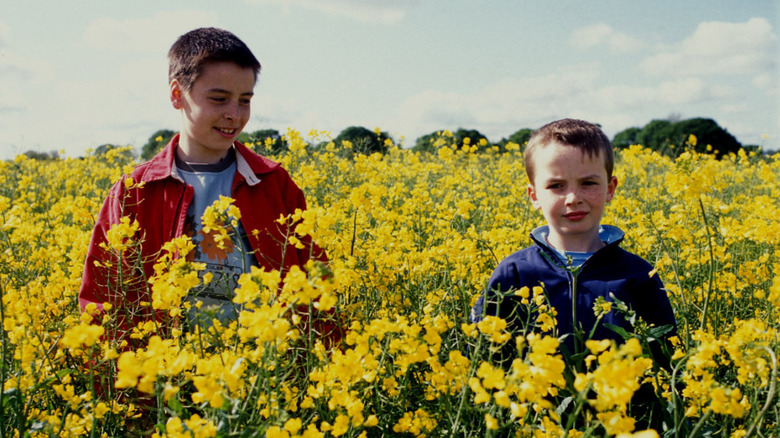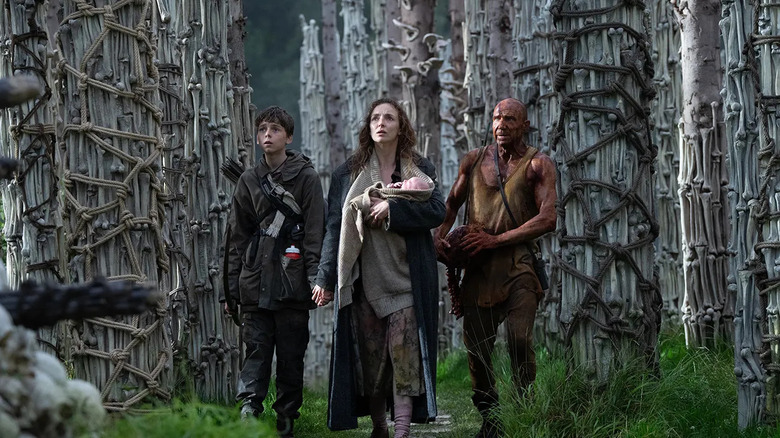28 Years Later Has A Lot In Common With The Most Underrated Danny Boyle Movie
This article contains spoilers for "28 Years Later."
As a part of the press tour for the release of "28 Years Later," director Danny Boyle was asked by a Tik Tok creator to do a blind ranking of his own favorite five films that he's made. Although the director was being set up to select "28 Years Later" for the number one spot, Boyle swerved in a different direction and chose "Millions" instead, the movie he made in 2004 in between the one-two horror/sci-fi punch of "28 Days Later" and "Sunshine." While some commenters on social media find this choice baffling, it's not at all uncommon for an artist to value a work of theirs that's generally under seen or underrated. In some cases, this is near-self-promotion, with the artist shining a spotlight on something they feel wasn't given a fair shake.
In the case of Boyle and "Millions," however, the filmmaker's affection for the movie feels especially genuine, and nowhere is that more apparent than a viewing of his latest film. Boyle is an auteur, of course, and thus there are numerous stylistic tics and thematic threads that connect all of his movies and make them part of a cohesive filmography. Yet while "28 Years Later" is a sequel to Boyle's "28 Days Later" and features elements that appear in a lot of his other films, it's "Millions" that the movie seems to have the most in common with. Because Boyle's work on "Millions" is genuinely underrated, the aspects of it that turn up again in "28 Years Later" are very welcome. In fact, it's these qualities that both movies share that helps make "28 Years Later" one of the most unique and remarkable post-apocalyptic horror movies ever made.
The religious underpinnings of Millions and 28 Years Later
Right from the beginning of his career, Danny Boyle proved himself as adept in playing around with genre conventions as much as he manipulates a film's pace and tone. As such, the majority of his movies are either genre mash-ups or uniquely unusual in their approach. "Millions" is no exception, for while what reputation it does have is largely as a sweet family film, its plot is essentially rooted in film noir, and is something like Sam Raimi's "A Simple Plan" (or Boyle's own debut, "Shallow Grave") but with wide-eyed children instead of jaded adults. In the film, a 9-year-old boy named Damian (Alex Etel) and his older brother Anthony (Lewis Owen McGibbon) come across a bag full of cash money while playing near the train tracks in their industrial suburban town. While Anthony tries to devise a way of keeping the money and using it for himself and his family, the devout Catholic Damian begins to give the money away in various charitable ways. Unfortunately, one of the thieves who stole the money in the first place comes back looking for it, putting Damian's plan of giving as well as his and his family's lives in danger.
One of the most remarkable things about "Millions" is how it treats Damian's Catholicism with respect. In another movie, his insistence on giving the money away to others or using it for other charitable purposes would be scoffed at, and the boy's faith would likely be belittled in the process. "Millions" is not Catholic propaganda, however — the movie depicts Damian's version of the faith, not that of the institution's. Boyle and screenwriter Frank Cottrell-Boyce explore how Damian's worldview affects everything around him, with Boyle inserting cutaways and flights of fancy as further examples.
The same can be said for the characters in "28 Years Later," as Spike (Alfie Williams) is a part of an isolated community on a remote island, who seem to have established an offshoot faith of their own since the outbreak of the Rage virus in 2002. This faith seems to be extremely traditional (which is to say patriarchal), and puts an emphasis on everyone having a role in the community that they stick to and take pride in. As per his machismo-filled father, Jamie (Aaron Taylor-Johnson), Spike is intended to be a hunter. Where "Millions" positions Damien's faith as a positive, motivational force, "28 Years Later" calls into question the island's rigid beliefs, especially when a man who lives in the mainland that Jamie and others have deemed a dangerous lunatic, Dr. Kelson (Ralph Fiennes), is discovered by Spike to be a kindly, intelligent man who's simply found his own spirituality within the post-apocalypse.
Millions and 28 Years Later both explore a boy's coming of age in a gritty world
At their core, "Millions" and "28 Years Later" are coming of age stories, and even though the former is a bit more traditional than the latter, both are deeply and keenly felt. That's because Boyle, Cotrell-Boyce, and "Years" writer Alex Garland introduce their young protagonists to the pitfalls of life without pulling any punches. Yes, "Millions" sugar-coats these lessons a little bit in the form of Damian's daydream fantasies and visions of saints, but Boyle can't help but bring an edge to these fairy-tale like trappings; in the way that the heroin-induced fantasies of Renton (Ewan McGregor) in "Trainspotting" were sweetly perverse, Damian's visions in "Millions" are perversely sweet. In keeping with that sense of subversion, one could argue that "Millions" actually isn't a coming of age movie, insofar as Damian doesn't undergo a huge change during the course of the film. While he does indeed have an awakening with regards to the stolen money and it causing more harm than good, his faith is rewarded in the end, with his sense of charity seemingly resulting in some wells being built in order to help impoverished communities living in Africa.
The path from boy to man is much harsher and more traditional in "28 Years Later," but it's also just as tenderly touching as "Millions," making "Years" the rare post-apocalyptic zombie film you can have a cathartic cry at. Once again, Boyle's sense of subversion is at play; where in another film the clearly sensitive Spike would reject his father's insistence at being trained as a killer, Spike comes to understand the value of being able to survive in a harsh world of the Infected, yet still rejects Jamie (and the village's) patriarchal, uncaring attitude toward those in need. Given the movie's cliffhanger ending (and a direct follow-up film to be released in January of next year), it's highly likely that Spike's maturation has only just begun. Yet "Years" feels complete enough in order to deem it on par with "Millions" and its life lessons.
The most direct parallel between the two films is that both Damian and Spike have to suffer the loss of their mothers. For Damian, the actual event has occurred offscreen before we meet him, yet the boy's visions of her indicate how much her loss has affected him and his family. Conversely, Spike must endure the slow decline of his mother Isla (Jodie Comer), who is not dying of the Rage virus but rather cancer. While Boyle fortunately didn't have to suffer such incident as a boy himself, he was raised by a devout Catholic mother who wanted him to become a priest, a life which he obviously rejected. This may be the core of Boyle's fluid tonalities in his films, particularly these two; there are higher powers, and there is harsh reality, and the two must find a way to coexist. In the cinema of Danny Boyle, they certainly do.


